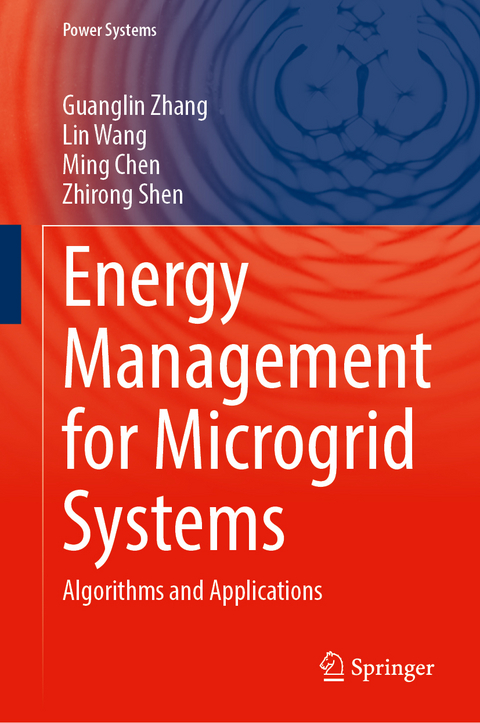
Energy Management for Microgrid Systems
Springer International Publishing (Verlag)
978-3-031-78563-4 (ISBN)
- Noch nicht erschienen - erscheint am 06.04.2025
- Versandkostenfrei
- Auch auf Rechnung
- Artikel merken
This book provides an in-depth discussion of the significance of energy management in microgrids, focusing on three key areas: multi-energy cooperative management in single and multi-microgrid systems, and energy management issues related to the Internet of Vehicles (IoV) in microgrids.
In Part 1, the book emphasizes the collaborative management of multiple energy sources, considering electric, gas, hydrogen, and renewable energy for a single microgrid system. In Part 2, it addresses the challenges in multi-microgrid systems and proposes a scheduling scheme for multi-energy cooperative management. Finally, Part 3 investigates the energy management challenges posed by the Internet of Vehicles in microgrids, and proposes a management scheme for electric vehicles (EVs) within microgrids using deep reinforcement learning.
Overall, the algorithms discussed in this book are essential for addressing the energy management challenges in microgrids.
Guanglin Zhang received the B.S. degree in applied mathematics from Shandong Normal University, Jinan, China, in 2003, the M.S. degree in operational research and cybernetics from Shanghai University, Shanghai, China, in 2006, and the Ph.D. degree in information and communication engineering from Shanghai Jiao Tong University, Shanghai, in 2012. From 2013 to 2014, he was Post-Doctoral Research Associate with the Institute of Network Coding, the Chinese University of Hong Kong. He is currently Professor in Donghua University, Shanghai. His research interests include online algorithms, capacity scaling of wireless networks, vehicular networks, smart microgrids, and mobile edge computing. He has been Local Arrangement Co-Chair of ACM TURC 2017 and 2019 and the Vice Technical Program Committees' Co-Chair of ACM TURC 2018 and 2021. He is Editor on the Editorial Board of IEEE/CIC CHINA COMMUNICATIONS.
Lin Wang received the Ph.D. degree in control theory from the Academy of Mathematics and Systems Science, Chinese Academy of Sciences, Beijing, China, in 2009. After the Ph.D. degree, she joined the Department of Automation, Shanghai Jiao Tong University, Shanghai, China, where she has been Professor since 2019. She was Visiting Associate Professor with Harvard University from January 2018 to August 2018 and was Visiting Associate Professor with Manchester Institute of Technology (MIT) from August 2018 to January 2019. Her research interests include multi-agent systems, adaptive complex networks, energy management, and evaluation of connected and automated vehicles.
Ming Chen received the B.S. degree in mathematics and applied mathematics from Anqing Normal University, Anhui, China, in 2018. She is currently pursuing the Ph.D. degree in information and communication intelligence system from Donghua University, Shanghai, China. Her research interests include the smart grids, energy management, and deep reinforcement learning.
Zhirong Shen received the B.S. degree in communication engineering from Donghua University, Shanghai, China, in 2017, and received the Ph.D. degree in information and communication intelligence system from Donghua University, Shanghai, China, in 2023. His research interests include the energy scheduling and the co-generation in microgrid.
Part I. Multi-Energy Coordinated Management in Single Microgrid System.- Chapter 1. Online Energy Management for Microgrids with CHP Co-generation and Energy Storage.- Chapter 2. Optimal Energy Management for Microgrids with Combined Heat and Power (CHP) Generation, Energy Storages, and Renewable Energy Source.- Chapter 3. Intelligent Energy Scheduling in Renewable Integrated Microgrid with Bidirectional Electricity-to-Hydrogen Conversion.- Part II. Multi-Energy Coordinated Management in Multi-Microgrid System.- Chapter 4. Energy Scheduling for Networked Microgrids with Co-Generation and Energy Storage.- Chapter 5. Online Energy Management and Heterogeneous Task Scheduling for Smart Communities with Residential Cogeneration and Renewable Energy.- Chapter 6. Combined Carbon Capture and Utilization with Peer-to-Peer Energy Trading for Multi-Microgrids Using Multi-Agent Proximal Policy Optimization.- Part III. Vehicle-to-Grid based Energy Management in Microgrid System.- Chapter 7. Real-Time Battery Thermal Management for Electric Vehicles Based on Deep Reinforcement Learning.- Chapter 8. Smart Online Charging Algorithm for Electric Vehicles via Customized Actor-Critic Learning.- Chapter 9. Real-time Energy Management for Microgrid with EV Station and CHP Generation.
| Erscheint lt. Verlag | 6.4.2025 |
|---|---|
| Reihe/Serie | Power Systems |
| Zusatzinfo | Approx. 250 p. |
| Verlagsort | Cham |
| Sprache | englisch |
| Maße | 155 x 235 mm |
| Themenwelt | Naturwissenschaften ► Biologie ► Ökologie / Naturschutz |
| Technik ► Elektrotechnik / Energietechnik | |
| Schlagworte | Carbon Emission • Combined Heat and Power (CHP) • Cost Minimization • Deep Deterministic Policy Gradient (DDPG) • Deep reinforcement learning (DRL) • Electric Vehicle • Energy Management • Energy scheduling • Energy Storage • Energy Trading • Hydrogen • Lyapunov optimization • Markov decision process (MDP) • Microgrid • Online scheduling • Peer-to-Peer (P2P) • Power-to-gas (P2G) • renewable energy • Smart communities • vehicle-to-grid (V2G) |
| ISBN-10 | 3-031-78563-0 / 3031785630 |
| ISBN-13 | 978-3-031-78563-4 / 9783031785634 |
| Zustand | Neuware |
| Informationen gemäß Produktsicherheitsverordnung (GPSR) | |
| Haben Sie eine Frage zum Produkt? |
aus dem Bereich


